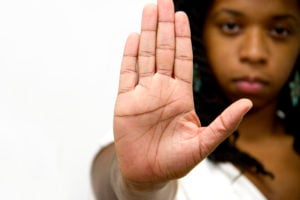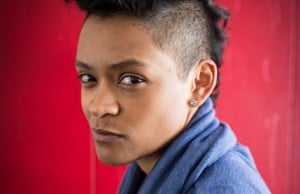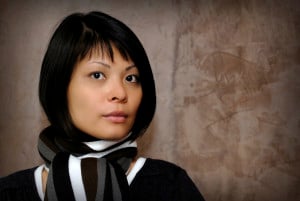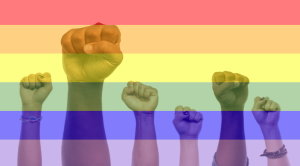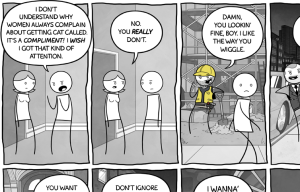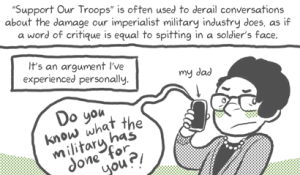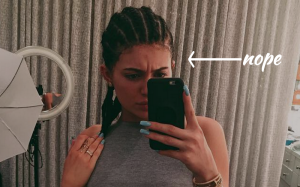Marina: Hi. Welcome to Feminist Fridays, a series where we explore the social, the political, and the media from a feminist and intersectional perspective – and use a lot of f-words.
On today’s episode of Feminist Fridays I’m going to be a’ing some of your q’s, answering some of your questions. I’m still trying to come up with a catchy title for it, but that’s not really happening. I was thinking about calling it Q&F for questions and feminism, but I’m pretty sure I’m the only one who thinks that’s clever.
Kat Culbertson asks: “What is your view on women’s colleges and their inclusion of transgender students, both female to male and male to female? A lot of their policies make it very hard for even already transitioned male to female applicants to be considered eligible.”
I will be the first person to admit that there are a lot of problems within feminism. Obviously there are lots of different types of feminism, but something that I see a lot in feminists texts, and online today, are feminist spaces that are trans-exclusive, meaning they don’t consider transgender women who were assigned male at birth to be real women, which I think is completely unacceptable and really discriminatory.
I think denying trans identities as valid is not only super shitty but also ignores the intricacies and nuances of gender, and I think the only way that we’re really going to learn about the social construction of gender is by listening to trans experiences and becoming more trans-inclusive.
With that in mind, I think we should be striving to make women’s spaces inclusive to trans women. I also don’t think that necessarily means we need to immediately push out trans men from these spaces. I think there are a myriad of reasons why a trans man would choose to stay at a women’s only school, and I think ultimately it should be up to them to decide.
“How can I talk to my parents about feminism calmly and professionally in a way that will make them consider my point? I come from a very conservative family. Whenever I tried to bring it up in the past, my dad likes to bring up the old adage, Why can’t a man hit a woman then?”
First off, I totally get the frustration of trying to explain social justice issues to family members. Especially with parents, there’s this whole power dynamic which makes them a lot less open to hearing different perspectives from their kids. I know it’s frustrating, but I think a good way to go into it is maybe explain your ideas without necessarily labeling them as feminist. I don’t think that an idea should be rejected simply because a feminist idea, but I think it makes people in general a little more open to whatever you’re saying because they’re not immediately put off by the label.
“What are your opinions on how the feminist movement is so often associated with its mishaps, to the point where people will often see a mishap where non exists, rather than all the great things it’s working towards?” I’ve definitely noticed that whenever someone talks about feminism they often have to preface their argument with a million clarifications like, “I don’t hate men,” or, “I don’t believe in this particular idea.” This may be shocking news, but every feminist is different. Just because some prominent feminists might say or believe in something doesn’t mean I necessarily agree with that. I think it’s extremely counterproductive that whenever someone tries to have a discussion they have to immediately backpedal and clarify that they’re not like those other terrible feminists. Of course there’s always going to be people online who will have a problem with what you’re saying no matter how many times you clarify it, simply because you’re calling yourself a feminist. I don’t really think those kinds of people are worth anybody’s time.
“Do you think feminism is the most important issue facing the world today? This includes, but is not limited to, poverty, crime, homelessness, war, slavery, human trafficking, sexuality, racism, healthcare, etc.”
I have a feeling that this is probably a rhetorical question, but that’s fine. I don’t really know what your view of feminism entails, but I would argue that intersectional feminism encompasses all of those issues. Intersectional feminism acknowledges that there are multiple spears of oppression, so not just sexism but racism, classism, ableism. All of these issues are interlocking and are not mutually exclusive. I think in order to really effectively see the big picture as a feminist, you need to acknowledge all of these intersecting spears.
Anyway, thank you guys for asking questions. Let me know what you guys want to see for next week’s Feminist Fridays. On last week’s Feminist Fridays we interviewed a boy and asked him what it was like to date a feminist/me.
Marina’s boyfriend: Anna Howard Shaw v. Susan B. Anthony. Who’s winning in a fight, fisticuffs?
Marina: Was she a racist?





